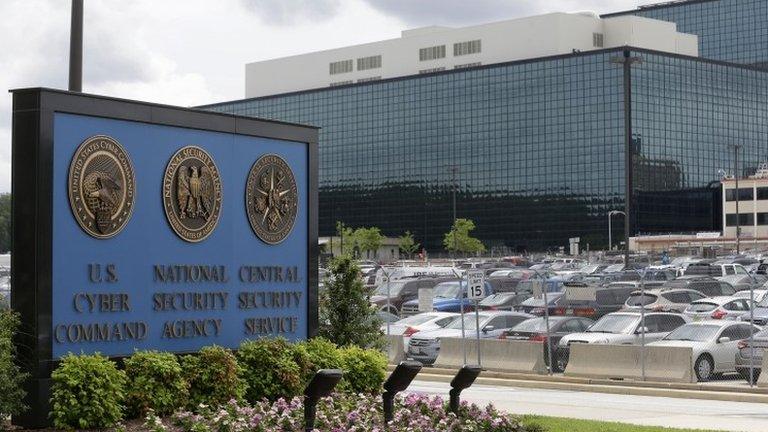Fellow Republicans can't stand Rand Paul's NSA fight
- Published
- comments
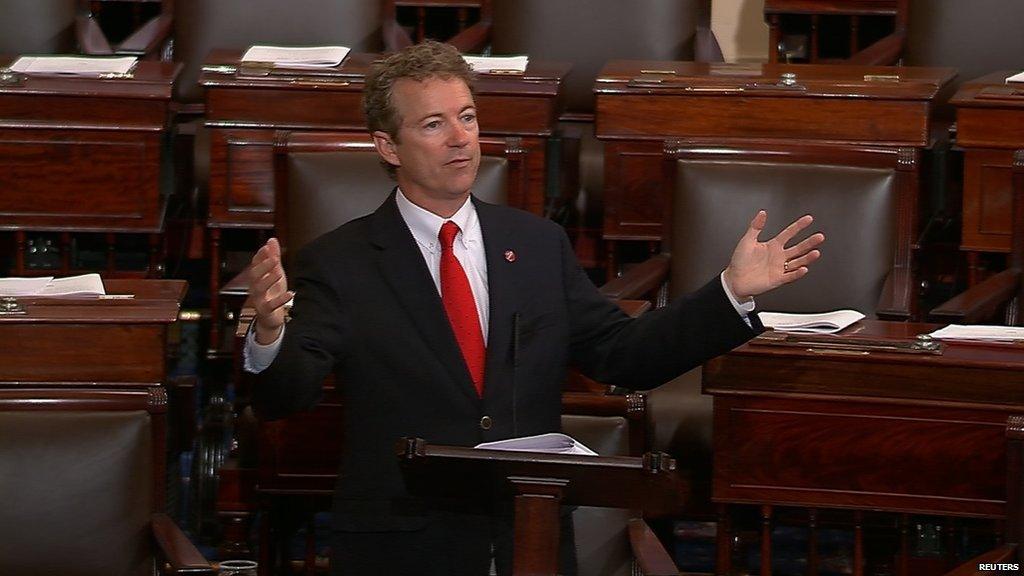
Mr Paul's views on NSA surveillance set him apart from the crowded field of Republican presidential candidates
The US Senate was the scene of high drama on Sunday, with Kentucky Republican and US presidential hopeful Rand Paul at the centre of the storm.
The libertarian-leaning son of former congressman Ron Paul effectively ground Senate action on renewing key provisions of the Patriot Act to a halt. Due to his efforts, the legal authority for the National Security Agency's bulk data collection programme have expired - at least temporarily.
It was a personal victory that he trumpeted from the floor of the Senate. "Tonight begins the process of ending bulk collection," he said, adding: "The point we wanted to make is, we can still catch terrorists using the Constitution."
Mr Paul's opponents didn't see it that way, however. Those who weren't accusing him of endangering US national security blasted him for what they saw as grandstanding in the interest of advancing his presidential interests.
"I know what this is about - I think it's very clear - this is, to some degree, a fundraising exercise," Arizona Senator John McCain told, external Politico on Sunday. "He obviously has a higher priority for his fundraising and political ambitions than for the security of the nation."
Mr Paul's adversaries point to his tweets leading up to Sunday night urging supporters to take pictures of themselves watching the senator's speech on TV and repeated exhortations to "stand with Rand" in opposing extended NSA powers.
Last week it appeared, external Mr Paul's campaign also may have run afoul of congressional rules when it used footage of one of his recent Senate speeches in a YouTube video.
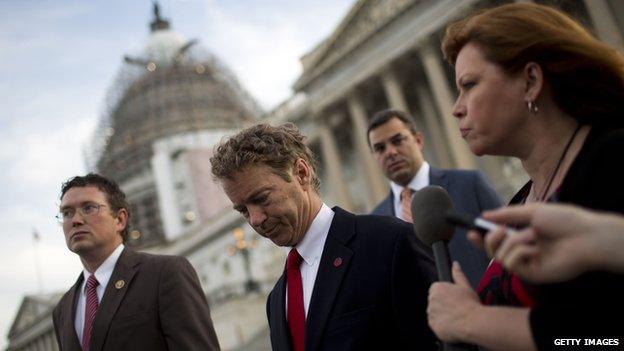
Mr Paul's opponents have accused him of endangering national security
Mr Paul bristled at the criticism, saying on Sunday: "People here in town think I'm making a huge mistake. Some of them, I think, secretly want there to be an attack on the United States so they can blame it on me."
Regardless of the motivations behind the senator's actions - and his staff adamantly insists that his moves were based on long-held principle, not political expediency - Sunday's events put the Kentucky senator squarely back in the national spotlight. As recently as last week, some political wags were wondering whether the Kentucky senator's stands on issues like national security and criminal justice were sinking his campaign.
"Though Paul may think his Republican Party's brand sucks, the primary voters don't necessarily share his view that the party is too old and too white," Dana Milbank of the Washington Post wrote, external. "His candidacy has so far failed to ignite - and, indeed, he seems to be fading as a force within the party."
But by successfully blocking extended NSA powers, Mr Paul has a new feather in his cap that might rally voters to his side.
"He's never brought the Senate to its knees as he has done now," Politico's Manu Raju wrote. "He has a rare opening to stand out in dramatic fashion from a very crowded GOP field - on an issue central to his presidential campaign."
Tim Mak and Olivia Nuzzi of the Daily Beast said, external Mr Paul's "human roadblock" strategy could pay dividends convincing the libertarian true believers who supported his father's presidential campaigns that he, alone, is with them.
"Paul's surveillance-ending stunt places him happily in opposition to the Obama administration and his rivals in the Republican primary field," they write. "Chris Christie, Jeb Bush and Marco Rubio favour a robust metadata collection program. Ted Cruz was an early co-sponsor of the USA Freedom Act, which would reform the Patriot Act and end the government's bulk collection of American metadata."
Mr Paul's recent moves could come with a high price, however. It has attracted the renewed ire of much of the party's foreign policy establishment and may have cost him the support of Senate majority leader Mitch McConnell - the powerful Kentuckian who had earlier expressed support for his candidacy.
"The senior senator from Kentucky - who is not known for his capacity to forgive and forget - was clearly displeased with his home state colleague," wrote, external Buzzfeed's John Stanton.
One of Mr Paul's fiercest opponents on the campaign trail could turn out to be the man who formally declared in South Carolina on Monday, Senator Lindsey Graham.
Mr Graham has regularly taken shots at the Kentucky senator, calling his foreign policy views "to the left of President Obama" and noticeably, external rolling his eyes when Mr Paul recently spoke in the Senate.
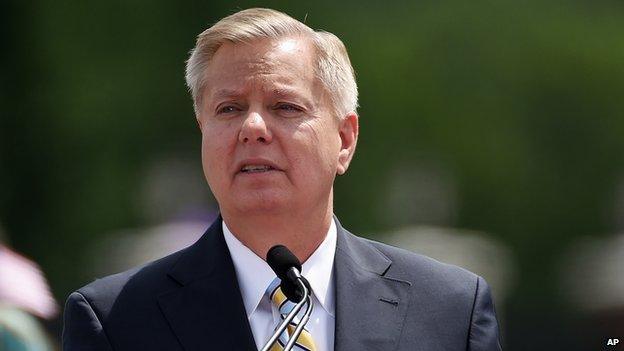
US Senator Lindsey Graham has been a strong supporter of the Patriot Act
Candidates for presidential nominations usually end up successful because they find a way to unite their party's disparate interests, cobbling together a large enough coalition to prevail over their opponents. For Republicans, however, the NSA issue is deeply divisive.
If Mr Paul's opposition to NSA surveillance is going to prove a winning issue for him, he needs to hope that it allows him to consolidate his support while the rest of the field continues to be split among a variety of candidates.
Recent polls in Iowa, for instance, show how the current political playing field could work to his advantage. According to the latest Bloomberg survey, Mr Paul is tied for second place with 10 points, seven behind Wisconsin Governor Scott Walker.
"Paul's support from independents is a key reason he's in the top tier of candidates in Iowa, as is his strength among those under age 45, a group where he gets support from 19% - the most of any candidate," wrote, external Bloomberg's John McCormick.
If Mr Paul's senatorial efforts this weekend bring in new young and independent voters, it's not impossible to imagine that he inches closer to the lead.
The question, however, is what happens when the field narrows. Sunday may have put Mr Paul back in the presidential game - but how long can he stay there.
- Published1 June 2015
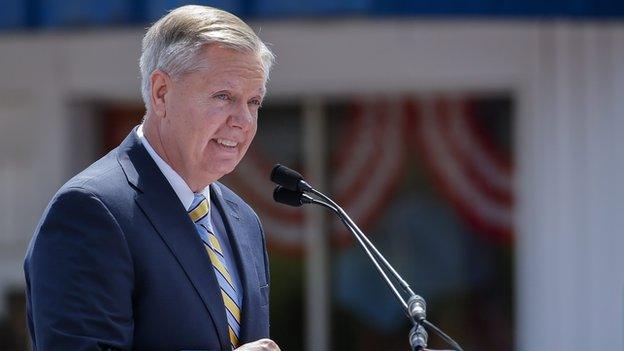
- Published1 June 2015
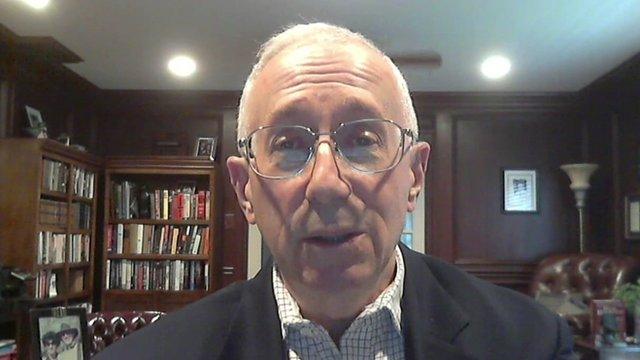
- Published1 June 2015
